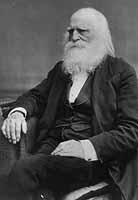To A Waterfowl Poem by William Cullen Bryant
To A Waterfowl
Whither, midst falling dew,
While glow the heavens with the last steps of day
Far, through their rosy depths, dost thou pursue
Thy solitary way?
Vainly the fowler's eye
Might mark thy distant flight to do thee wrong
As, darkly seen against the crimson sky,
Thy figure floats along.
Seek'st thou the plashy brink
Of weedy lake, or marge of river wide,
Or where the rocking billows rise and sing
On the chafed ocean side?
There is a Power whose care
Teaches thy way along that pathless coast--
The desert and illimitable air--
Lone wandering, but not lost.
All day thy wings have fanned,
At that far height, the cold, thin atmosphere,
Yet stoop not, weary, to the welcome land,
Though the dark night is near.
And soon that toil shall end;
Soon shalt thou find a summer home, and rest,
And scream among thy fellows; reeds shall bend,
Soon, o'er thy sheltered nest.
Thou'rt gone, the abyss of heaven
Hath swallowed up thy form; yet, on my heart
Deeply has sunk the lesson thou hast given,
And shall not soon depart.
He who, from zone to zone,
Guides through the boundless sky thy certain flight,
In the long way that I must tread alone,
Will lead my steps aright.
in the last stanzas it's obvious. William is saying that the waterfowl, the duck, goose or whatever might make it somewhere to sleep and not be shot by a hunter, and that he himself might also be safe if that same God protects him... He who, from zone to zone, Guides through the boundless sky thy certain flight, In the long way that I must tread alone, Will lead my steps aright. great poem, profound philosophy set to rhyme.
This poem has not been translated into any other language yet.
I would like to translate this poem
Great writing and it is wonderful.